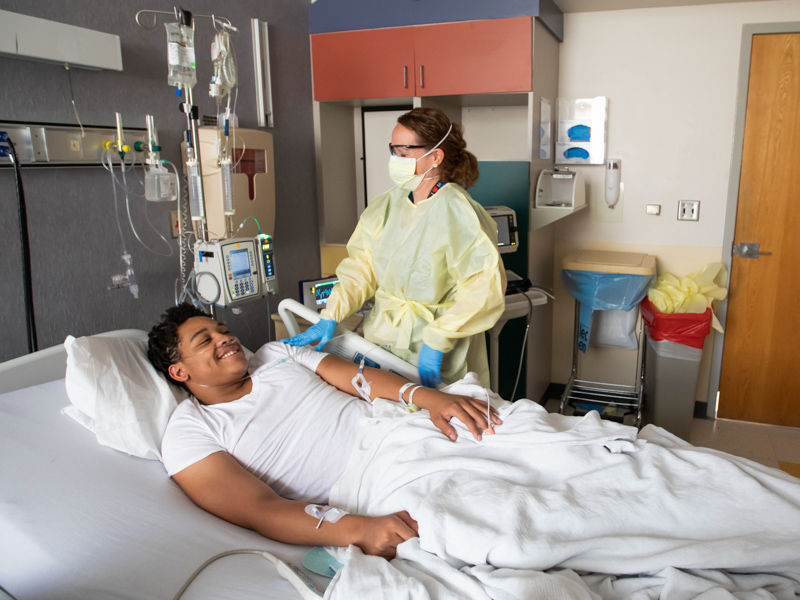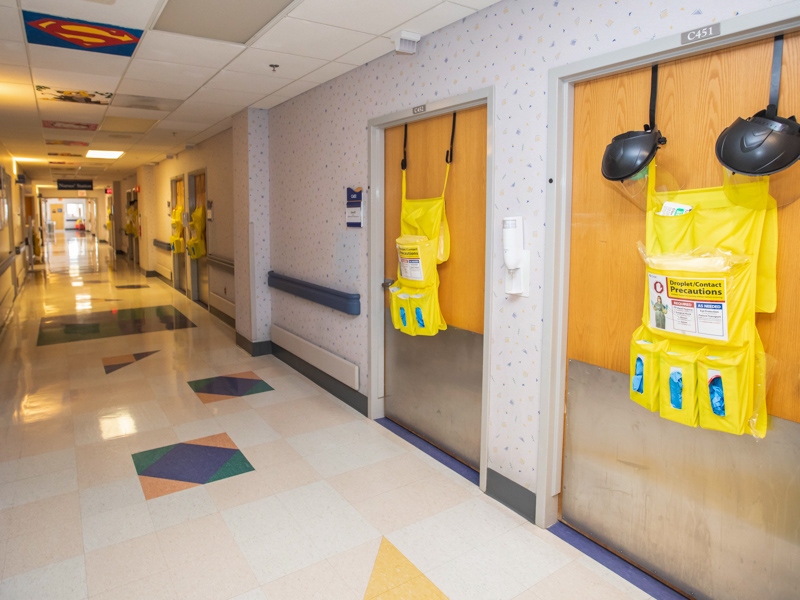‘It’s unrelenting’: Rising pediatric COVID-19 cases stress full children’s hospital

Editor's note: As of 9 a.m. Friday, the number of children hospitalized at Children's of Mississippi for confirmed or suspected cases is 30, a hospital record.
In the 2020 version of COVID-19, most children infected did not show symptoms that developed into serious health conditions. That’s not the case today, as nationally and in Mississippi, the Delta variant of COVID-19 is driving up the number of children hospitalized at Children’s of Mississippi.
On Monday, 22 children were hospitalized in Children’s of Mississippi due to COVID-19, including three children in intensive care. Inside the state’s only children’s hospital, the beds are full.

“The pediatric COVID-19 cases are going up, but the other cases we traditionally see aren’t stopping,” said Dr. Jennifer Hong, associate chief medical officer for Children’s of Mississippi. “The RSV cases keep coming. We are still seeing traumas – like car wrecks and gunshot wounds, sepsis, cancer, and heart failure. Those haven’t stopped. It’s unrelenting.”
Just as in the adult hospital at the University of Mississippi Medical Center, Children’s of Mississippi is also under stress as medical teams work to care for large numbers of children infected with respiratory viruses and a rising number of children with COVID-19.

“We’re now seeing new COVID-19 admissions who are otherwise healthy children,” said Dr. Mary Taylor, Suzan B. Thames Chair, professor and chair of pediatrics at the University of Mississippi Medical Center.
Patients like Keelyn Green, 16, a senior at Jim Hill High, have faced life-threatening illness after being infected with COVID-19. After first experiencing symptoms Aug. 4, Green came to the Pediatric Emergency Department at Children’s of Mississippi Aug. 7 with problems breathing.
“I was scared for him,” said his mother, LaKeitta Brown. “He had double pneumonia. His oxygenation was low, and his heart rate was elevated. His liver and kidneys were being affected.”
He went to the pediatric intensive care unit, moving to a hospital room in a medical-surgical unit Thursday. Dr. Laura Wright-Sexton treated him there four days for acute hypoxic respiratory failure and bacterial and COVID pneumonia.
Green and his extended family were unvaccinated, choosing instead to be careful and wear masks, Brown said. “Keelyn had been inside most of the summer, but he was exposed to COVID from a family member who didn’t know he had been near someone with COVID. Everyone in the family got it but his uncle, and he was vaccinated.”
Keelyn and his family plan to get vaccinated soon.
While Keelyn was healthy prior to his COVID-19 infection, “some of our patients with COVID-19 have other conditions, and some have COVID-19 plus RSV,” Taylor said. “Many are here with just COVID.”

RSV, or Respiratory Syncytial Virus, brings on cold-like symptoms and can cause serious illness in young children as well as in older adults. A common virus spread via respiratory droplets when a person coughs or sneezes, RSV is the most common cause of pneumonia and bronchiolitis in children younger than 1.
Usually, RSV is seen in winter months, but this year, the virus surged among children in the summer.
“The things people can do to protect themselves and their families from COVID-19 also work to protect against RSV and other viruses,” Taylor said. “Wearing face masks, good hand hygiene and social distancing protects everyone.”
Children’s of Mississippi Chief Nursing and Clinical Services Officer Ellen Hansen said availability of beds in the state’s only children’s hospital fluctuates.

“Sometimes we have beds and children are admitted right away,” Hansen said, “and other times, they may wait in the Pediatric Emergency Department for a bed to open for a few to many hours.”
While hospital staff are exhausted, they’ve been rising to the challenge, she said. “Staff are tired, as we all are, with the constant changes and unknown. However, we remain focused on providing excellent care to the children and families we serve.”
Hansen said parents should still seek medical help for their children when needed. “When people avoid care, children get sicker or we have delayed diagnoses, both of which could be fatal.”
Dr. April Palmer, chief of pediatric infectious diseases, said most children with COVID-19 are being hospitalized for either pneumonia, an infection that inflames the lungs’ air sacs, making breathing difficult, or MIS-C, or Multisystem Inflammatory Syndrome in Children, a severe inflammatory reaction throughout a child’s body that occurs about four weeks after a COVID-19 infection.

Both situations can be life-threatening, Palmer said. “This is why, in school, we strongly recommend vaccination for those who qualify and universal masking.”

Dr. Roberto Santos, professor of pediatric infectious diseases, agrees. “We need to let the families know that we really don’t know the long-term effects of COVID-19 in children, and we are seeing those long-term effects already in adult patients.”
Because fewer children were seriously ill with COVID-19 during the pandemic’s earlier surges, there is less data available on best treatments, said Dr. Charlotte Hobbs, stressing that protecting children who are not eligible to be vaccinated is essential. “Plus, we have few treatment options for prevention of progression to severe disease or treatment – especially in younger children – as compared with adults.”
Emergency use authorization of some treatments used successfully on adults does not apply to children younger than 12, she said.
If more Mississippians were vaccinated against COVID-19, fewer children would be in the hospital with it, Taylor said. Though the Pfizer-BioNTech vaccine can’t be given to children younger than 12, adult vaccinations reduce the chances children will contract the virus.
“Those who are eligible to receive a COVID-19 vaccination should do it,” she said. “We have an increasing number of children who are needing hospitalization for COVID-19. Adults should get vaccinated to protect those who are not eligible to be vaccinated.”


